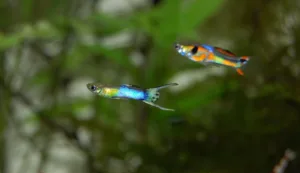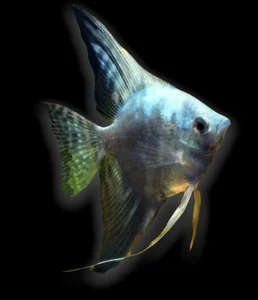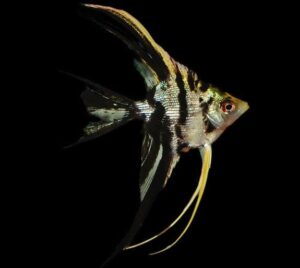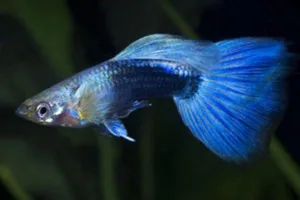A kohaku guppy is a fancy guppy breed that is named after the Kohaku koi fish, which is known for its distinct white and orange coloration. Kohaku guppies have a white body with orange markings on the back and tail. The orange markings can be solid or have a marbled appearance. Kohaku guppies can also have red eyes, which further resembles the Kohaku koi fish.
Kohaku guppies are relatively easy to care for and make good pets for beginners. They are also relatively hardy and can tolerate a wide range of water conditions. However, it is important to provide them with a clean and well-filtered tank with plenty of hiding places. Kohaku guppies are also social fish and should be kept in groups of at least 5-6 individuals. In this Kohaku Guppy Care Guide we will look at best ways to breed guppies, optimal tank setup and where to buy.
The key characteristics of Kohaku guppies are:
- Distinctive appearance: Kohaku guppies have a white body with orange markings on the back and tail. The orange markings can be solid or have a marbled appearance. Kohaku guppies can also have red eyes, which further enhances their beauty.
- Social fish: Kohaku guppies are social fish and should be kept in groups of at least 5-6 individuals.
- Relatively inexpensive to purchase: Kohaku guppies are relatively inexpensive to purchase, making them a good option for budget-minded hobbyists. Average price is $3 to $5 per a fish.
- Size: Kohaku guppies are typically 1.5-3.5 cm (0.6-1.4 in) long for males and 3-6 cm (1.2-2.4 in) long for females.
- Origin: Kohaku guppies are a fancy guppy breed that was developed through selective breeding – Native to central and south America
- Care requirements: Easy to care for, good for community aquariums.
- Diet: Omnivore, eats a variety of foods, including flakes, pellets, and live food.

Kohaku Guppy Care Guide
Tank Size
The best size tank for a Kohaku guppies is a 10 gallon size tank if you have a group of less than 5 fish. If you plan on having more than 5 fish you should move up to a larger tank like a 20 gallon to 55 gallon tank. The larger the tank the easier it is to keep the water clean and clear.
Filtration
Water quality is the most important part of keeping fish in your Kohaku guppies tank. One of the best options is the Fluval Aquaclear Power Filter, known for its reliability and customizable filtration. Another excellent choice is the Eheim Classic External Canister Filter, its quiet operation and efficient mechanical and biological filtration.
Substrate Choices:
For substrate, consider choosing fine gravel, aqua soil or sand. These options are ideal as they are easy to clean, provide a natural appearance, and allow for the rooting of live plants.
Plant Selection:
The best plants for a guppy tank are those that are easy to care for, provide plenty of hiding places for fry, and don’t require a lot of light. Here are a few of the most popular choices:
- Java moss: Java moss is a very hardy plant that can thrive in a variety of conditions. It is also very good at providing hiding places for fry
- Anacharis: Anacharis is a fast-growing plant that can help to improve water quality. It is also a good choice for guppy tanks because it provides plenty of hiding places for fry.
- Hornwort: Hornwort is another fast-growing plant that is easy to care for. It is also a good choice for guppy tanks because it provides plenty of hiding places for fry.
- Water wisteria: Water wisteria is a beautiful plant that can add a lot of interest to a guppy tank. It is also a good choice for guppy tanks because it provides plenty of hiding places for fry.
- Amazon sword: Amazon sword is a popular choice for guppy tanks because it is easy to care for and provides plenty of hiding places for fry. It is also a good choice for larger guppy tanks.
Steps for setting up your tank :
- Choose a location for your tank. The tank should be placed in a level spot where it will not receive direct sunlight.
- Clean the tank. Rinse the tank with water to remove any dust or debris. Do not use soap or detergent, as this can be harmful to fish.
- Add the substrate. Add a 2-3 inch layer of substrate to the bottom of the tank.
- Add the decorations. Rinse the decorations thoroughly before adding them to the tank. Be careful not to overcrowd the tank with decorations, as guppies need plenty of swimming space.
- Fill the tank with water. Use dechlorinated water to fill the tank. You can use a water conditioner to remove chlorine and other harmful chemicals from the water.
- Install the filter, heater, and air pump. Follow the manufacturer’s instructions to install the equipment.
- Cycle the tank. This involves establishing a colony of beneficial bacteria in the tank. The bacteria will help to break down fish waste and other toxins
- Test the water. Once the tank has cycled, test the water to make sure that the parameters are within the safe range for guppies. The ideal water temperature for guppies is 72-78 degrees Fahrenheit. The pH should be between 6.5 and 7.5 with <0 Nitrates and Nitrites
- Add the guppies. Start by adding a few guppies to the tank and monitor them closely for any signs of stress. If the guppies seem to be doing well, you can add more fish to the tank gradually.
Tank Mates
Kohaku guppies are peaceful fish that can be kept with other community fish of similar size and temperament. Some good tankmates for Kohaku guppies include:
- Neon tetras
- Zebra danios
- Corydoras catfish
- Platies
- Swordtails
- Mollies
Breeding

Breeding Kohaku guppies is relatively easy in a home aquarium. If you are interested in breeding Kohaku guppies, it is important to have a separate breeding tank. The breeding tank should be planted with floating plants to provide cover for the fry.
To breed Kohaku guppies, simply place a male and female guppy in the breeding tank. The female will become pregnant within a few days. The gestation period for guppies is around 21 to 30 days.
Once the female guppy is pregnant, she will develop a dark spot on her abdomen. This spot is called the gravid spot and it is a sign that the female is close to giving birth.
When the female guppy is ready to give birth, she will isolate herself from the other fish. She will then give birth to live fry. The fry will be very small and will need to be fed a diet of infusoria or baby brine shrimp until they are large enough to eat regular food.
Here are some additional tips for breeding yellow cobraGuppies:
- Use healthy and well-fed fish for breeding.
- Keep the breeding tank clean and well-maintained.
- Provide the fish with a variety of foods to ensure that they are getting the nutrients they need.
- Remove the male guppy from the breeding tank after the female is pregnant.
- Feed the fry a diet of infusoria or baby brine shrimp until they are large enough to eat regular food.
Where to buy and average price
Kohaku guppies can be purchased from a variety of sources, including:
- Local fish stores: This is a great option if you want to see the fish in person before you buy them. You can also ask the staff questions about the fish and their care requirements.
- Online fish retailers: This is a convenient option if you can’t find Kohaku guppies at your local fish store. However, it is important to choose a reputable online retailer like petco that offers healthy fish and a live arrival guarantee.
- Aquarium clubs and breeders: Aquarium clubs and breeders are often a great source of high-quality yellow cobraGuppies. You can find aquarium clubs and breeders in your area by searching online or contacting your local fish store.
The average price of a Kohaku guppies varies depending on the source and the quality of the fish. However, most Kohaku guppies can be purchased for between $2 and $5 each from local store. If you are planning on purchasing from a breeder you can plan on spending $10-$25 per a fish.










